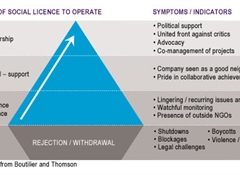Home : Commentaries : Would New Zealanders give you a licence to operate?
Commentaries
Would New Zealanders give you a licence to operate?
16 Dec 14

By Graeme Colman.- Sometimes a story about how we treat employees crashes through the media clutter – and reminds us how important it is to behave sustainably.
That how we treat people and the planet in our legitimate pursuit of profits really is quite important.
Major news coverage – and a public backlash – greeted news of some fuel sellers’ practice of deducting the cost of theft by drive off customers from lower-paid employees’ wages.
No-one should have been really surprised by instant anger and threats of consumer boycotts generated in just hours of the news breaking.
In a country where 92% of adults now have access to the internet and Horizon Research finds 75% of them – more than 2.52 million - are using Facebook each month, outrage and action can drive change in behaviours and policies within hours.
More than 62 sustainable business and consumer behaviour studies by Horizon (and its wholly acquired ShapeNZ research service) since 2005, leave little doubt about how New Zealanders want each other to behave. For significant numbers of employees and consumers the way businesses manage their impacts on the environment and society will determine if they will continue to work for them, buy from them or support policies essential to them.
Research conducted by Boutilier and Thomson (Canada), and Sinclair Knight Mertz (SKM), defines some of the factors influencing businesses’ licence to operate. Companies and other organisations may like to consider how their behaviour might engender approval or disapproval.
Boutilier and Thomson and SKM describe four levels of the social licence to operate and say most companies and projects are located at the acceptance or approval level most of the time.
Employers who try to make vulnerable lower-paid employees pay for others’ crimes, as we have seen in fuel retail, generate an opportunity to be rejected, facing boycotts and legal challenges.
No-one thought in the recent debate to apply the same rule to shop assistants: should their wages be docked to compensate for shop lifting, reportedly costing hundreds of millions a year?
Businesses and community groups should be aware that New Zealanders have a common and mostly unchanging value set:
Typically about 75% are for economic growth, are outward looking and want businesses and the country to innovate and lead the world, are for an open economy and see economic growth as important in maintaining and improving their quality of life. This majority desires economic growth but at the same time wants to protect and not damage the environment. They see this as under pinning their quality of life, it imparts hope for the future – and crosses over nearly all demographic criteria (age, gender, occupation, income, employment status, location and political parties supported). Maintaining their family values, a cohesive society and protecting the environment are seen as essential by a majority.
Consequently, this value set impacts on a wide range central and local government policy making. With the ability to form secure coalition governments dependent currently on support shifts of 3% or less among the total eligible voting population, a business’s licence to operate can depend significantly on how it understands and manages New Zealanders’ values and wishes.
The potential gains and losses for sectors and individual enterprises from this are large.
Sustainable management of supply chains, employment, social, community and environmental issues offer significant benefits to businesses in New Zealand.
Conversely, a failure to operate sustainably runs the risk of immense brand damage and loss of business and opportunity and changes in policy settings.
At the same time, the community sector must also behave sustainably.
Businesses are extensively involved in community and social activities.
A Horizon Research survey of businesses for the Charities Commission in 2012 found only 8.9% of respondents said that their organisations had not supported charities in the previous 12 months.
A May 2013 Horizon Business and Consumer Behaviour Survey for the Sustainable Business Council and Fairfax found 47% of organisations giving money, 36% staff time and 29% in-kind gifts. 21.2% had strategic long term partnerships with civil society organisations.
The research indicated that with about 1.9 million people then in paid employment, the time of the equivalent of as many as 649,000 employees was being volunteered.
To maintain and grow this massive support – and mutual benefit – charities and civil organisations also need to be highly aware of the main factors driving this engagement.
Being ethical and honest, well-managed, efficient – and not only making a real difference but communicating this are all key factors.
We don’t need to thieve because there are thieves.
We are better rewarded by making the positive differences and maintaining our values and the quality of the places we live in – which result in 85.2% of adults New Zealanders enjoying their lives here while 2.1% only are mostly not or not at all (0.5%).
Better we build tolerance, support and co-operation than suffer rejection, withdrawal and decline.
- Graeme Colman in Principal of Horizon Research Limited. This article was first published by Business and Community Shares ( BACS), which connects businesses and community organisations for public benefit. Horizon is a member company. Graeme is also on the BACS Steering Committee. Horizon has specialised in sustainability and charities research since 2005.
[1] Boutilier and Thomson http://socialicense.com/publications/Modelling%20and%20Measuring%20the%20SLO.pdf, Achieve Magazine article, Sinclair Knight Merz
http://www.globalskm.com/Insights/Achieve-Magazine/Issue4-2011/article1.aspx
[2] Statistics New Zealand Business Demography Statistics: February 2012
HorizonPoll Online Survey system
and website developed by BEWEB
Copyright © 2010. HorizonPoll incorporating ShapeNZ - Listening to New Zealand


